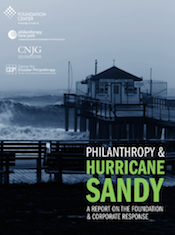Publication Date: October, 2014
This new report from CNJG and partners examines the response of foundations, corporations, and other institutional donors to the devastation wrought by Hurricane Sandy in...
... CNJG has been working closely with their philanthropic members in New Jersey and their philanthropic colleagues from ... Coastal Communities Site Visit Tours CNJG offered its members a rare opportunity to tour...
... and vision. We look for opportunities for individual members, member institutions, and allied organizations across ...
... in New Jersey is a 3-part series introducing CNJG members to impact investing. The series will take place from ... breakfast and lunch is included. COST : Free for CNJG Members Registrants must attend all three...
... in New Jersey is a 3-part series introducing CNJG members to impact investing. The series will take place from ... be led by John Duong, Kind Capital. COST: Free for CNJG Members Registrants must attend all three...
... in New Jersey is a 3-part series introducing CNJG members to impact investing. The series will take place from ... learn directly from those involved. COST : Free for CNJG Members Registrants must attend all three...
... Innovation . One of CNJG’s important roles is connecting members with potential partners in government. And while ... to Renee. On June 24, I was pleased to join several CNJG members at a funders’ briefing hosted by...
... by sending any and all funding opportunities from our members and other funders to add to this page. Our goal is to ...
... for Healing Arts, Rowan University. Cost : Free for CNJG Members; $75 for Non Member Grantmakers This program is open ...
... Access All New Jersey-based nonprofits, including all members of CNJG and the New Jersey Center for Nonprofits , ...
... to the generous and unwavering support from you, our members, CNJG has continued to grow and thrive, even in the ... Spina, PSEG Foundation. Following the annual meeting of members, trustees elected their officers...
... . CNJG has created a new Disaster Response listserve for members to share information and resources, coordinate on ...
Publication Date: November, 2015
This weekly conference call series welcomed New Jersey-based grantmakers along with national funders and provided an opportunity for grantmakers to hear from a wide range of experts in the field of disaster philanthropy. This series started on...
... Legal Landscape, Part 3 (5/12/2025) Programs by CNJG Members Monmouth & Ocean Roundtable of Funders (2/18/2025) ... working to advance health equity in New Jersey. Members of the advocacy and racial justice...
Publication Date: September, 2010
This advocacy and civic engagement toolkit is designed for private foundations that want to educate and encourage their grantees about getting involved in civic and policy activities to increase organizational capacity and impact. While its primary...
Publication Date: April, 2014
Nonprofit Finance Fund's Annual Survey chronicles the challenges facing the nonprofit sector and calls out some of the targeted investments we can start to agree...
Publication Date: June, 2010
... that the effort will engage parents and community members in local and statewide efforts to improve schools. ...
... we’ll convene an open-forum conference call for CNJG members to share how your organization might be thinking ...
... open ! We’re opening registration exclusively to CNJG members until Friday, April 26, so please secure your spot ...

